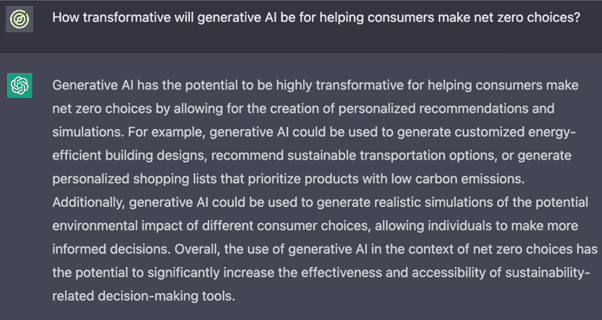This is the Sponsored paywall logged out

In her latest column for Utility Week, the Centre for Net Zero chief executive Lucy Yu discusses the potential impact of AI chatbot ChatGPT. Given the need to raise public awareness around the net zero journey, could this prove a valuable tool?
 Elon Musk believes it’s ‘scary good’, Bill Gates thinks it’s ‘a glimpse of what is to come’ and others have said it is ‘the end of Google’. If you haven’t heard of ChatGPT, it’s the new AI chatbot from OpenAI that everyone is talking about.
Elon Musk believes it’s ‘scary good’, Bill Gates thinks it’s ‘a glimpse of what is to come’ and others have said it is ‘the end of Google’. If you haven’t heard of ChatGPT, it’s the new AI chatbot from OpenAI that everyone is talking about.
Since its launch in November last year, the hype around this new platform has grown exponentially – so much so that its servers are struggling to keep up with the millions of people using the platform. ChatGPT surpassed one million users in just five days; achieving the same milestone took Netflix 41 months, Facebook 10 months, and Instagram 2.5 months respectively.
Amid the tech gloom, generative artificial intelligence has gripped Silicon Valley and beyond, as tools that generate text, images and sounds in response to short prompts seize widespread attention. A background in natural language processing means that I’ve been keeping a close eye on its evolution – and it’s clear that the emergence of ChatGPT represents an inflection point for this field of AI.
The potential implications of software that can create novel content and answer any query in a way that makes sense to a human are far reaching. It can generate fluent answers to our biggest and smallest questions, churning out everything from original long-form essays and programming code to haikus and job applications. Many have pointed to its ability to transform the education sector, customer service models and software development. But what could its implications be for the energy transition?
In its current form, ChatGPT fundamentally offers a conversational tool that can provide bespoke information to its users. We know that a major barrier to overcome in our net zero journey is consumer awareness and a systems-level change in behaviours and technology adoption. Could ChatGPT’s proposition offer households a better way to find out more about changes to the energy system, compared to existing search engines? And what does ChatGPT think it can offer?
 Not a perfect response – but given ChatGPT’s relative infancy, it’s clear that a tool with this kind of capability has the potential to become highly valuable over time, helping households around the world to navigate the energy transition.
Not a perfect response – but given ChatGPT’s relative infancy, it’s clear that a tool with this kind of capability has the potential to become highly valuable over time, helping households around the world to navigate the energy transition.
The AI bot has been trained on a large dataset of text: its creators have fed it with hundreds of billions of words in the form of books, conversations and web articles. This means that the platform has the potential to provide fast, accurate and largely reliable information to a wide-range of requests.
The conversational interface can address complex questions – and follow-up questions – in a way that isn’t so easily achieved using today’s most popular online search portals. Rather than searching for ‘heat pumps installations’ and facing a wave of generic information, households can get custom, personalised answers to questions about installing heat pumps in the type of property they live in; the range of insulation and energy efficiency measures they might need to adopt first; and what grants are available to them to help overcome upfront costs.
There are, of course, serious concerns about ChatGPT that we must carefully consider, beyond its infancy. The chatbot’s training data for the current release ends in the year 2021, so up-to-date information isn’t available. Asked what heat pump grants are available in the UK, there’s no mention of the government’s flagship Boiler Upgrade Scheme that was launched last year, offering up to £6,000 in grants to support the adoption of heat pumps. The importance of retraining the model and keeping it updated is therefore paramount, as well as adding citations for source information.
Critically, ChatGPT doesn’t know what is true or false. It simply repeats information that it has already seen before, with no way to distinguish between facts and fake news. Professor Michael Wooldridge from the Alan Turing Institute neatly sums this up: “If you ask it for a recipe for an omelette, it’ll probably do a good job, but that doesn’t mean it knows what an omelette is.”
Finally, the chatbot is trained on pre-existing materials. When it comes to emerging low carbon technologies (LCTs) and novel energy behaviours, the relevant datasets and knowledge bases are rapidly evolving. This means that it’s easier for ChatGPT to write about commonly discussed topics, such as a Dickens novel or the importance of chlorophyll, rather than fast-moving innovations. There’s also a socioeconomic barrier to consider: ChatGPT is likely to provide a set of recommendations that are skewed towards middle income households, as a result of the existing dataset. Much of the material available about the adoption of LCTs and energy efficiency measures are targeted at early adopters or wealthier households who can afford to consider what remains a significant investment – despite the rapidly falling costs of LCTs.
Only time will tell whether ChatGPT can live up to its hype, overcoming its current challenges to allow millions of people around the world to harness its full potential. But with careful retraining and consideration, the platform could become a powerful tool we can leverage to support consumers on the transition to a future energy system that puts people at its heart.
Please login or Register to leave a comment.